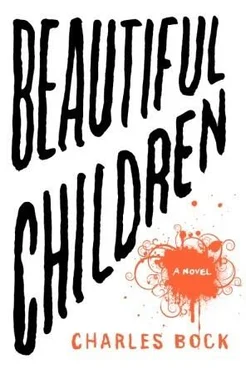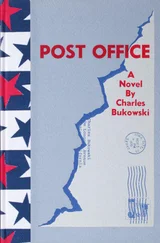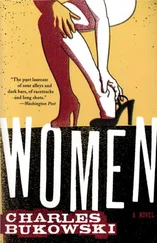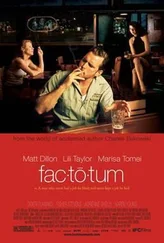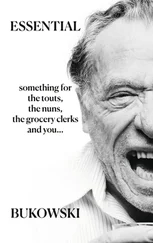He took a weak breath.
Music thumped. Bass bumped. Extras laughed and high-fived and hooted.
While the wisps of smoke danced upward, behind the guy's glasses, his eyes were large and brown and apologetic. They were relieved.
He purposefully avoided looking up at her, instead staring at Cheri's smoking tits for two, three seconds. His Adam's apple bobbed. He let out another breath and for a moment seemed to concentrate. And here the level of his stare rose. Reflected neon and white ribbons of electric light danced along the lenses of his spectacles, and suddenly his face revealed itself as stony, possessed, as if he had just reached a decision.
3.3
The bill feeder unceremoniously rejected Kenny's dollar for what felt like the hundredth time. His shoulders hunched and tensed, and he curled over the front of the machine like a question mark, grabbing the bill with a defeated swipe, returning to the task of rubbing the dollar over the gleaming steel console, trying to iron out its creases. From the next machine, Newell landed an elbow into his abdomen. “This is sweet. How sweet is this?”
The boy pumped five nickels into a slot. His index finger jabbed on a square yellow button in the middle of the console. He quickly slapped a green button with his palm.
“Ooowh. Almost got me a fully loaded convertible!”
Another thrown elbow. “See. I look twenty-one. I'm always telling my dad.”
A nudge now. “Damn. Two cherries that time.
“You played Tetron IV? I just rented it from Blockbuster. Those graphics are way better.”
Rubbing his ribs, Kenny stared back. Although hair obstructed his view, and caused him to blink rapidly, he took in Newell's energy and joy, felt its contagious spread. He laughed, an awkward, donkeylike snort, and tried the dollar in front of him once more, but again the father of our country reappeared, scrolling out from the bill feeder like a mocking green tongue. “It's broke,” Kenny said. “Mine's broken.”
“Mine works great. See. Nothing to it.”
Kenny shook his head. With hasty jerks, he began searching through his pants for another dollar, and had a fleeting thought of the Nintendo system his aunt had bought him two Christmases ago, the controlling stylus veering crazily to the right side of the screen. “So,” he said. “Bing was really cool to me.”
Newell continued staring into the screen, dropping coins.
“He's actually really nice.”
“I still say you should have come for Byrne and them.” He punched Kenny's shoulder, then made a second motion. When Kenny flinched, Newell nailed him twice more. Kenny rubbed his shoulder, although Newell's words hurt a lot more, and Kenny could not just rub away their truth. He stared for a moment at the small moth holes along his sleeve, at the curl of thinned cotton at that sleeve's end. Then he became distracted, something frilly skimming along the small of his back. And it wasn't just frilly, either — a fair amount of weight pressing at him.
A dumpy woman. Making her way between the stools and players, she filled the black leotard as if it were a sausage casing. Her arm was raised straight above her head, and she was balancing a small tray filled with neon drinks. She brushed past Kenny and looked back over her shoulder, ready to apologize. As Kenny watched her eyes narrow, a penny of doubt lodged in his chest. She kept moving, though, and squeezed past a large-boned housewife in imitation designer evening wear, navigating the narrow space of the row, eventually delivering a bottle of amber beer to a dumpy-looking grandfather, whose smile of thanks revealed a missing set of uppers.
“This is the life, huh?” Newell's elbow dug once more at Kenny's ribs. “Free and easy.”
The boy pumped away, oblivious, dropping more coins into the slot machine like he couldn't get rid of his money fast enough. Kenny eyed the waitress, watching her sloppy rear shift from left to right as she continued her route. When she turned a corner, he kept staring down the row, checking to see if she — or anyone else — might be coming back. Newell said something that Kenny did not pay attention to. Still he grunted an affirmative response, and momentarily absorbed the sight of the large-boned housewife — she was gazing at the terminal in front of her with dead eyes, clutching a rosary in her large-knuckled fist, blowing a large pink bubble and then sucking it back in. Each time she pulled at the slot, she performed this little ritual, Kenny saw. Along the row, he saw baggy retirees chain-smoking and playing two machines apiece, rotely jabbing a left-right sequence of buttons on one machine, then repeating the sequence on the other. Their faces were uniformly drained from extended bouts of concentrated anticipation, yet still focused on the screens in front of them. Kenny watched a husband and wife playing their machines side by side. He watched friends wasting the night hanging out and drinking and playing. Groups of people that were ostensibly together, yet were separate together.
He became faintly aware of a series of electronic tones next to him, Newell removing his titanium wafer from its holster, Newell checking the number of the call, pressing a button.
The ringing ended. “That should take care of them,” the boy said. He took up the drawl of a popular rapper: “Let's get this party started right.”
“Once you start to play a lot,” Kenny answered, “you don't really think about each spin.” He recognized an urgency in his voice, a fervor whose intensity almost took him aback. Thinking over what he wanted to say now, he slowed down, took care to be precise, and repeated if not the exact words, the ideas he'd heard from his aunt through the years. “Here's the thing. The last spin was just like this one. This one is like the next. You lose and then you win and most of the times if you win it's just three coins. Even if it's a bunch more, they're only nickels.”
Newell took in the wisdom. An exclamation point snorted through his nose.
“Don't you need the machine to take your money first?”
The boy grinned at his own cleverness, and now smacked the yellow button, an ecstatic punctuation. Computerized clicks sounded. Graphics simulated the acceleration of slots and then their slowing. The screen in front of Newell started blinking and flashing.
“YEAAAAH-DAAAWG.” Newell pogoed on his stool. The musical notes of celebration continued. “THAT’S WHAT I’M TALKING ABOUT.”
3.4
Francesca was long gone and most of the girl's friends had bailed, and what remained were friends of friends mostly, a few half friends, and a couple of kids the girl did not know, older kids, juniors and seniors, all of them scattered around the truck, resting on stolen milk crates, broken-down ice cream coolers, and a few old bar stools with torn cushions and leaky stuffing. Green Wool James was at this makeshift table. This douche bag named Piggy was next to him, nodding and using Wite-Out to paint the fingernails of her other neighbor, some zit-faced idiot with a white picket fence for a Mohawk — he kept dragging on a cigarette, then tapping its ash into a smoked green bottle. Talk about the war had died down, and attentions had turned to Sellout, this drinking game, everyone going around their little makeshift table, naming great rock songs that had been turned into commercials. The Beatles and “Revolution” for Nike got things started, although that was more a ghost story than fact, it had happened so long ago that most of the people in the truck hadn't been alive back then, nobody had even seen the actual commercial. But everyone knew about it, just like they knew “Satisfaction” by the Rolling Stones for Microsoft. And the Who got tagged for that “best I ever had” song, which had been used by Lexus automobiles. Then what all agreed was a damn fucking shame: Princess Cruises’ purchase of Iggy Pop's “Lust for Life.” Which was quickly topped by Black Sabbath's “Crazy Train” and its accompanying television spot for Nissan, which got tabbed as the ultimate crime against rock, until someone trotted out Zeppelin's barrage of Cadillac commercials, and Queen's “We Are the Champions” for an erectile dysfunction pill, and, oh yeah, the Ramones’ atrocity (corn chips or cell phones or whatever it was). Naturalamente, Dylan came next, “The Times They Are A-Changin,” the investment house of Bendem, Over, and Plunge.
Читать дальше
